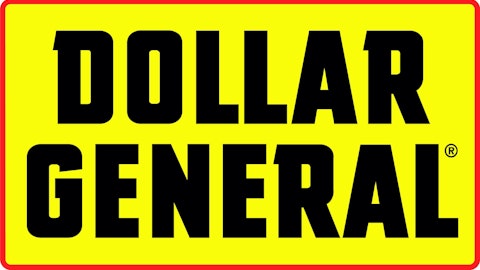Wal-Mart Stores, Inc. (NYSE:WMT) is another one of Simons’ low beta, dividend-paying defensive stocks. Wal-Mart’s most recent quarterly results showed revenue growth of 3.4% on the back of positive same store sale growth. One of the added benefits to this defensive stock is its international presence. This, along with its diverse product offering, helps Wal-Mart maintain its 0.4 beta. Despite its below-average volatility, the retailer has still managed to beat the S&P 500 Index year to date on stock performance, thanks in part to strong earnings the past three quarters. The world’s largest private employer also pays a dividend yield of 2.3% with a payout ratio of only 32%. Billionaires Warren Buffett and Bill Gates are two of Wal-Mart’s most notable shareholders, each having around 4.5% of their 13F portfolios invested in the retailer (check out Warren Buffett’s newest picks).
RenTech increased its Family Dollar Stores, Inc. (NYSE:FDO) stake by 25% last quarter. This discount retailer does trade on the high end when compared to its peers on a P/E basis at 18x, but looking at its forward P/E (14x) suggests investors may be underestimating Family Dollar’s growth. Sales are expected to climb 13% in FY2013 on the back of 5% growth in same store sales. The retailer has embarked on an aggressive store remodeling program to help continue attracting cost-conscious customers, while also expanding its customer base by offering consumables.
Although the stock’s 1.2% dividend yield might be the main attraction for investors at the moment, we believe its growth prospects should be of greater focus. The retailer is expected to grow five-year EPS at 15% annually, with a 0.5 beta. That’s a simple, yet effective formula for market outperformance that many low-volatility stocks don’t possess. Interestingly, Family Dollar was shunned from our list of top ten retail stocks loved by hedge funds, despite the fact that both of its top rivals Dollar Tree and Dollar General made the cut (see all 10 here).
Duke Energy Corp (NYSE:DUK) is now one of the leading utility companies following its merger with Progress Energy. Duke has had little stock movement in the last five years, thanks in part to its beta of 0.15. The stock is best known for its solid dividend, having made dividend payments since 1987, while currently yielding 4.8%. Revenues are expected to be up 35% in 2012 and 27% in 2013, thanks in part to added revenue from Progress. Duke should have no problem to continue to fund its dividend, as it seeks opportunities to raise rates in its regulated business while investing in commercial renewable energy assets. SAC Capital’s Steven Cohen is also one of Duke Energy’s big-name investors (see Steven Cohen’s top bets).
To recap: Simons’ Medallion Fund (within RenTech) is one of the best hedge funds we have seen. Consistent double-digit returns helped propel Simons to billionaire status, while allowing him to charge above average fees to fund investors – a 5% fixed fee on AUM and a 44% performance fee. We believe that the defensive stocks listed can be used to reduce portfolio volatility, while providing above-average returns in an uncertain market environment.





